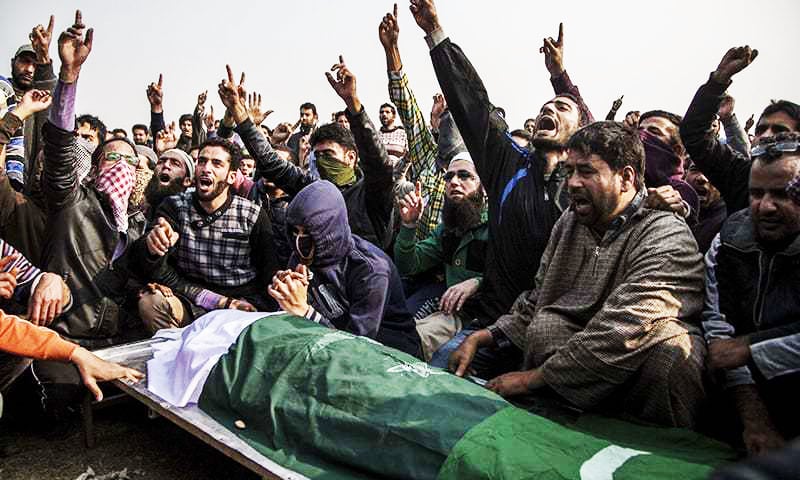
by Hamza Haider 20 July 2023
The Indian government’s appalling indifference to human rights and freedom of expression in Indian-administered Jammu and Kashmir is a stark reminder to the world of the dire situation faced by the human rights defenders in the region.
The international community must not remain passive and must act urgently to end these gross abuses and uphold the rights of the brave activists who have spoken out against the oppressive measures imposed on the Kashmiri people. A draft communique from the UN Special Rapporteur that has been leaked to the media reveals the grave alarm over the treatment of human rights defenders in IIOJK. The communique urges the Indian government to address the serious issues raised by the UN expert.
One of the focal points of the report revolves around the detention and alleged ill-treatment of Muhammad Ahsan Untoo, a prominent human rights defender. The Special Rapporteur expressed deep concern over the manner in which the Unlawful Activities Prevention Act (UAPA), a counter-terrorism law, has been exploited to justify the arbitrary arrest and ill-treatment of activists like Untoo.
The situation for journalists in IIOJK has been equally distressing, with at least 35 media professionals subjected to harassment and intimidation since August 2019. Police interrogations, raids, threats, physical assaults, and restrictions on freedom of movement have become commonplace for journalists in the region. The situation deteriorated further after June 2020, when the Indian administration introduced a ‘new media policy,’ granting them the power to censor news in the area and monitor media outlets and journalists whose reporting didn’t align with Indian interests in IIOJK.
This stringent media policy has emboldened the Indian military and police force to increase their harassment and intimidation tactics against Kashmiri journalists. Consequently, more than 450 journalists, lawyers, politicians, human rights activists, academics, and businessmen have been unjustly placed on a “No Fly List” without any judicial orders since 2019.
Ahsan Untoo’s case serves as a grim illustration of the Modi-led Indian government’s aggressive policy against human rights defenders. The Chairman of the International Forum for Justice and Human Rights (IFJHR) was arrested under false and fabricated charges, specifically under the UAPA. His arrest followed the submission of his testimony to the UK-based law firm Stoke White, where he detailed allegations of torture perpetrated by Indian forces under the command of Gen. Manoj Mukund Naravane and Home Affairs Minister Amit Shah, who are accused of being responsible for the kidnapping, torture, and killing of activists, journalists, and civilians.
The UN experts have consistently raised serious concerns about the Unlawful Activities (Prevention) Act, which allows for the designation of any individual as a terrorist without the need to establish ties to banned groups. This has been used as a tool of coercion against civil society, the media, and human rights defenders in IIOJK.
Since then, the Indian authorities have been cracking down on Kashmiri human rights activists, who have been documenting and exposing the violations committed by the security forces, such as torture, extrajudicial killings, enforced disappearances, and arbitrary detentions.
One of the most prominent activists who has been targeted by the Indian government is Khurram Parvez, the coordinator of the Jammu and Kashmir Coalition of Civil Society (JKCCS), an NGO that monitors human rights in the region. Parvez has been arrested twice on charges of conspiracy and terrorism under the Unlawful Activities (Prevention) Act (UAPA), a draconian law that allows the authorities to label anyone as a “terrorist” without any evidence or due process. He has been in detention since November 2021 and faces a possible life sentence if convicted.
Parvez’s case has drawn the attention and condemnation of several UN human rights experts, who have urged the Indian government to stop targeting him and other Kashmiri activists and to release them immediately. They have also called for greater accountability for the human rights violations in IIOJK and for an independent investigation by the UN and other relevant international bodies. They have expressed concern that the UAPA is being used as a means of coercion and repression against civil society, the media, and human rights defenders in IIOJK and in the rest of India.
The treatment of Parvez and other Kashmiri activists is a stark reminder of the chilling disregard for human rights and freedom of expression under the Modi-led Indian government. The plight of these activists, who courageously voice their concerns against oppression and injustice, deserves the immediate attention and action of the international community. The global community must not turn a blind eye to the escalating human rights crisis in IIOJK and must stand in solidarity with those who defend human rights in the region.
In light of these deeply troubling revelations, the UN Special Rapporteur has called for the immediate release of Ahsan Untoo and all other Kashmiri human rights defenders who have been ensnared in baseless and fabricated cases. The situation has prompted international human rights organizations to take effective notice and play their part in securing the freedom of those unjustly arrested in IIOJK.
